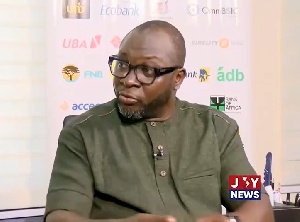- Home - News
- Elections 2024
- News Archive
- Crime & Punishment
- Politics
- Regional
- Editorial
- Health
- Ghanaians Abroad
- Tabloid
- Africa
- Religion
- Photo Archives
- Press Release
General News of Friday, 30 May 2025
Source: www.ghanawebbers.com
Past cedi depreciation caused by people manipulating it for profit - John Awuah
John Awuah, CEO of the Ghana Association of Banks, spoke about the cedi's depreciation. He said much of this decline was due to profiteering, not real economic factors.
During an interview on Joy News’ PM Express Business Edition, he highlighted currency manipulation. Awuah claimed this manipulation accounted for up to 30% of the cedi's past falls.
He previously estimated that speculation influenced currency movement by 20 to 30%. This means that a significant part of depreciation was not linked to actual transactions. Instead, it involved people trying to profit from temporary price changes.
Awuah noted that these speculators were not reacting to trade imbalances or economic shocks. They were simply exploiting the market for quick gains.
He explained that if the currency remains stable, trading becomes less attractive. Currently, the cedi is seen as more appealing for investments. People are looking for opportunities because it is not depreciating as quickly as before.
However, Awuah warned against confusing appreciation with stability. Businesses prefer a stable and predictable currency over a stronger one.
He cautioned against being overly excited about significant appreciation. The business community seeks predictability rather than wild fluctuations in value.
Inconsistent currency movements complicate planning for businesses. For example, if the exchange rate jumps from ¢5 to ¢10 overnight, it disrupts forecasting and investment decisions.
Awuah emphasized the need for stability in variables affecting revenue generation. If revenue relies on foreign currencies, unpredictable rates hinder effective planning.
While he expressed some confidence in the cedi's current performance, he refrained from making bold predictions. He stated he does not doubt its ability to remain stable but is unsure about reaching single-digit rates soon.











